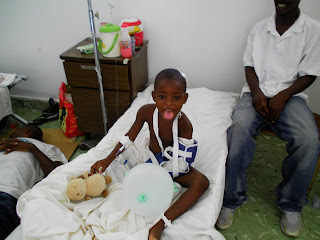
We roll out of our army cots on the converted patient ward for the last time. Tom, as usual, is up first. We have a ride to the airport at 6am so by 5:30 we're all busy doing some last minute packing, showering, and de-bulking our packs, mostly by giving stuff away to our Haitian friends. I benefitted from a lot of stuff left behind from previous folks (well mostly food, really), so I try and unload what I can. Tom as usual outdoes the rest of us ... he gives his bedding to Jeanty, and he gives his pillow to the lady with the forearm osteomyelitis from last night. She loves it, even with 9 days of accumulated sweat from Tom's noggin. We say bye to my replacement Rick, who now occupies the cot previously occupied by Julie from Loma Linda, then Kristen from Loma Linda. If I'm not mistaken, he'll the only doc here this week. Fortunately he's
 got two things to help him out: (1) more experience under his belt than I (he's been to Afghanistan among other places) and (2) Jess the nurse from Macon, who's supercompetent and should keep him on track. I tell him I hope we haven't left the place too much of a disaster. My biggest worry is still the lady with the above knee amputation wound ... last night when I signed out to him, I told him she needed another washout and VAC change on her leg today. She was looking better last night and her son personally thanked me and Tom and said he was happy that we'd been taking care of her - this really meant a lot to us to hear him say that and smile. In a week she went from puffy faced, edematous, hyperglycemic, febrile, and super painful ("sick as sh*t" in medical parlance), to sitting up in bed, smiling, talking, afebrile, and, well, may be a little less painful. The battle is far from over with her, and I'm anxious to hear how she does in the future.
got two things to help him out: (1) more experience under his belt than I (he's been to Afghanistan among other places) and (2) Jess the nurse from Macon, who's supercompetent and should keep him on track. I tell him I hope we haven't left the place too much of a disaster. My biggest worry is still the lady with the above knee amputation wound ... last night when I signed out to him, I told him she needed another washout and VAC change on her leg today. She was looking better last night and her son personally thanked me and Tom and said he was happy that we'd been taking care of her - this really meant a lot to us to hear him say that and smile. In a week she went from puffy faced, edematous, hyperglycemic, febrile, and super painful ("sick as sh*t" in medical parlance), to sitting up in bed, smiling, talking, afebrile, and, well, may be a little less painful. The battle is far from over with her, and I'm anxious to hear how she does in the future.We say our final goodbyes to friends here, both Haitan and expat. Besides Jeanty, Franz from xray has come, and o
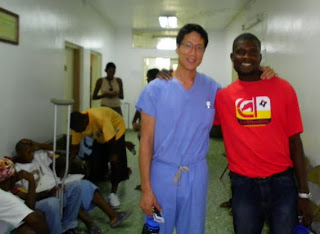 f course Nathan and Amy who are in overall charge here see us off. It's been a great 9 days and we're all truly thankful for getting the opportunity to stay at Adventist and work with such an awesome core team (Nathan, Amy, Brooke, Jess, and Kenny) and the various groups like us that have come in and out. People like Kristen and Cheri who stayed up multiple nights with the 31 week old preemie, doing their best in an NICU that has no ventilator. People like Khalid, Matt, and Jackie who took charge and anesthetized and monitored the lady with the open amputation wound when we had to take her urgently to the OR on a day when there was no anesthesia staff available. When we get to the airport to wait for the Miami flight, Thea from Boston Medical Center tells us about the poor chap that the ER folks saw on Thursday with the abdominal mass. I remember them curbsiding me in clinic that day and seeing this rock-hard mass coming out of his abdomen lik
f course Nathan and Amy who are in overall charge here see us off. It's been a great 9 days and we're all truly thankful for getting the opportunity to stay at Adventist and work with such an awesome core team (Nathan, Amy, Brooke, Jess, and Kenny) and the various groups like us that have come in and out. People like Kristen and Cheri who stayed up multiple nights with the 31 week old preemie, doing their best in an NICU that has no ventilator. People like Khalid, Matt, and Jackie who took charge and anesthetized and monitored the lady with the open amputation wound when we had to take her urgently to the OR on a day when there was no anesthesia staff available. When we get to the airport to wait for the Miami flight, Thea from Boston Medical Center tells us about the poor chap that the ER folks saw on Thursday with the abdominal mass. I remember them curbsiding me in clinic that day and seeing this rock-hard mass coming out of his abdomen lik e the thing from the Alien movies. Thea took him downtown to get a CT scan, chipped in to pay the $250 for the CT and the $40 for the oral contrast, and are going to seek consultation from colleagues in the US. (There was an MRI scanner too but that was damaged in the quake.) The sad thing is that even though this guy may have hit the lottery with the folks who've pitched in to take care of him, it's possible it may already be too late. You wonder what he was thinking for the two months it took him to get this big. In the US the answer is often denial, It's nothing. It'll go away. Meanwhile, there's a big fist-sized lump staring up at you and you say "Oh hello, you abnormal lump of flesh sticking out of my abdomen, are you still there? You haven't gone away yet?" Here, however, the usual answer is because that's how long it took them to see someone for it.
e the thing from the Alien movies. Thea took him downtown to get a CT scan, chipped in to pay the $250 for the CT and the $40 for the oral contrast, and are going to seek consultation from colleagues in the US. (There was an MRI scanner too but that was damaged in the quake.) The sad thing is that even though this guy may have hit the lottery with the folks who've pitched in to take care of him, it's possible it may already be too late. You wonder what he was thinking for the two months it took him to get this big. In the US the answer is often denial, It's nothing. It'll go away. Meanwhile, there's a big fist-sized lump staring up at you and you say "Oh hello, you abnormal lump of flesh sticking out of my abdomen, are you still there? You haven't gone away yet?" Here, however, the usual answer is because that's how long it took them to see someone for it.After the Port-au-Prince to Miami flight the big highlight is getting a good greasy burger in Tom and Liz's bellies, which is something they've been looking forward to all week long. Finally, late on a Sunday nigh
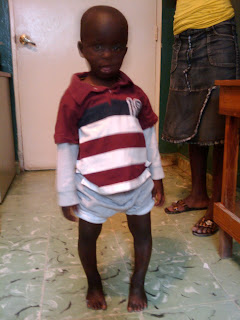 t, we're all finally back home. Liz to roommates, Tom to clean sheets (he always was the one with the most foresight and planning), and me to Corky who's raring to go for a walk. I just wanted to end by saying the Haitian friends we've met were absolutely incredible, and were the highlight of the past nine days for all of us. And also by saying that there is still a huge problem down there. Sure, the quake may have been 6 months ago, but there are a lot of patients still waiting to get taken care of - in fact, the majority of the people we saw. More importantly, though, the underlying reasons for why they're still being untreated - poverty, disparity of wealth, lack of infrastructure, lack of good "local-grown" orthopaedic care - are the same before and after the quake. As Nathan told us, the basic problems are the same now as they were before ... hopefully the earthquake can focus attention on Haiti and get these problems solved. Hopefully after a few years there will be a real orthopaedic training program so
t, we're all finally back home. Liz to roommates, Tom to clean sheets (he always was the one with the most foresight and planning), and me to Corky who's raring to go for a walk. I just wanted to end by saying the Haitian friends we've met were absolutely incredible, and were the highlight of the past nine days for all of us. And also by saying that there is still a huge problem down there. Sure, the quake may have been 6 months ago, but there are a lot of patients still waiting to get taken care of - in fact, the majority of the people we saw. More importantly, though, the underlying reasons for why they're still being untreated - poverty, disparity of wealth, lack of infrastructure, lack of good "local-grown" orthopaedic care - are the same before and after the quake. As Nathan told us, the basic problems are the same now as they were before ... hopefully the earthquake can focus attention on Haiti and get these problems solved. Hopefully after a few years there will be a real orthopaedic training program so that they can have a sustainable solution to taking care of people with broken bones. We'd love to be a part of that. For the last nine days, we did what we could, hopefully helped a few people out, hopefully grew in the process ourselves, and definitely made some really, really, good friends. Jeanty with his bag of toys and a mile-wide smile as he distributes them to the kids, Junior with his boundless energy just days after his father dies of AIDS in our hospital, the infectious enthusiasm and laughter of Tony, Albert, Emmanuel, and Franz. Several of them want to become doctors and surgeons, which I suppose is natural in a place where there's a lot of maimed people and very few people to take care of them. The young Haitians we met give me hope that this can be a better place.
that they can have a sustainable solution to taking care of people with broken bones. We'd love to be a part of that. For the last nine days, we did what we could, hopefully helped a few people out, hopefully grew in the process ourselves, and definitely made some really, really, good friends. Jeanty with his bag of toys and a mile-wide smile as he distributes them to the kids, Junior with his boundless energy just days after his father dies of AIDS in our hospital, the infectious enthusiasm and laughter of Tony, Albert, Emmanuel, and Franz. Several of them want to become doctors and surgeons, which I suppose is natural in a place where there's a lot of maimed people and very few people to take care of them. The young Haitians we met give me hope that this can be a better place.As we've waited for various flights today and eaten our greasy burgers (and 1 veggie sandwich), we've talked a lot about what this trip has meant to us, if things will ever change, and what - and whom - we'll remember the most. We'll leave you with some of Tom's reflections on our trip.
Reflections
My mind is a flurry of surreal thoughts and gritty emotion. I've just returned from a third world country, where si
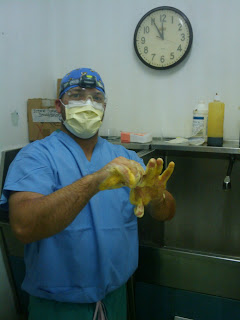 x months after a catastrophic earthquake, things appear to be not much different than they were before...except for the rubble which could fill the Louisiana Superdome 5-6 times, the death, the injuries, the lack of housing, the lack of food...the basic necessities to live. It's hard to swallow. Trash literally lines the streets, children sleeping on dirt floors, people carrying disease, the poorest of poor...this is Haiti. My memories dart back and forth, children bathing in street water (basically sewage and rain water), tents held together with pieces of clothing and twine, and a little boy who lost his father...yet never loses his smile. Haitians who have lost their homes, their place of work, their possessions, their limbs, their mothers, their fathers, brothers and sisters, their world literally came crashing down in 35 seconds...but they never lost their dignity, and their belief in God. This I know; you can see it in their faces. This is Haiti. The simpliest thing as a hug, or holding a patien
x months after a catastrophic earthquake, things appear to be not much different than they were before...except for the rubble which could fill the Louisiana Superdome 5-6 times, the death, the injuries, the lack of housing, the lack of food...the basic necessities to live. It's hard to swallow. Trash literally lines the streets, children sleeping on dirt floors, people carrying disease, the poorest of poor...this is Haiti. My memories dart back and forth, children bathing in street water (basically sewage and rain water), tents held together with pieces of clothing and twine, and a little boy who lost his father...yet never loses his smile. Haitians who have lost their homes, their place of work, their possessions, their limbs, their mothers, their fathers, brothers and sisters, their world literally came crashing down in 35 seconds...but they never lost their dignity, and their belief in God. This I know; you can see it in their faces. This is Haiti. The simpliest thing as a hug, or holding a patien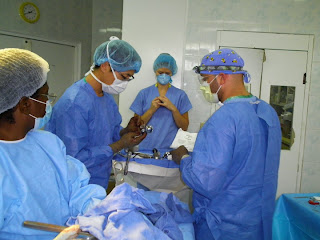 t's hand, offering them food (many go without), a basic smile, making eye contact, using your body language and facial expressions can speak volumes...even if you can't speak Creole. The very basic things we unknowingly takes for granted, means everything to these people. They don't crack, stoic people during a time of disaster...patient people who appreciate what we do. There is no magic cure, no perfect idea, it won't happen over night, or in six months...it hasn't gone away. This is Haiti. People speak of trying to reconstruct the city...these people are simply trying to survive...to make it to tomorrow. Some of the patients we saw died, and some may still. You can't hide from the reality, when it stares you in the face every day. You can't pretend like it doesn't hurt, because it does. You want to take away the pain, the anguish, and treat every single person you meet...but you can't...resources are limited...time is of the essensce...you want to work and operate around the clock...but you can't...you do what you can. This is Haiti.
t's hand, offering them food (many go without), a basic smile, making eye contact, using your body language and facial expressions can speak volumes...even if you can't speak Creole. The very basic things we unknowingly takes for granted, means everything to these people. They don't crack, stoic people during a time of disaster...patient people who appreciate what we do. There is no magic cure, no perfect idea, it won't happen over night, or in six months...it hasn't gone away. This is Haiti. People speak of trying to reconstruct the city...these people are simply trying to survive...to make it to tomorrow. Some of the patients we saw died, and some may still. You can't hide from the reality, when it stares you in the face every day. You can't pretend like it doesn't hurt, because it does. You want to take away the pain, the anguish, and treat every single person you meet...but you can't...resources are limited...time is of the essensce...you want to work and operate around the clock...but you can't...you do what you can. This is Haiti.I saw the beautiful country it is, and the beautiful people within...the beaches, t
 he countryside, the gorgeous homes and the wealth. I saw heartache, extreme poverty and pain...but I also saw hope. We give hope. I meet some of the most amazing people over the past nine days, and I came to realize something...each person who came to volunteer did just that...volunteer. You see, true compassion stems from the unconditional love you have for other human beings, other living things. You either have it, or you don't. These people did. Without hesitation, we give our time, our energy, our own compassion, to help another human being.
he countryside, the gorgeous homes and the wealth. I saw heartache, extreme poverty and pain...but I also saw hope. We give hope. I meet some of the most amazing people over the past nine days, and I came to realize something...each person who came to volunteer did just that...volunteer. You see, true compassion stems from the unconditional love you have for other human beings, other living things. You either have it, or you don't. These people did. Without hesitation, we give our time, our energy, our own compassion, to help another human being.Looking back, I don't need to feel proud, or receive any kind of recognition. I sure in the heck didn't do this for the glory. I guess sometimes everyone needs an outstretche
 d hand to help them up...these guys just need a lot of them, and we had six hands to lend. We wanted to help...we want to go back. It's a long road for the people of Haiti...and nobody knows how it will be built, but we can give our time, our smile, our hands. We can't fix everything, but we do what we can. We tried to do it in Haiti.
d hand to help them up...these guys just need a lot of them, and we had six hands to lend. We wanted to help...we want to go back. It's a long road for the people of Haiti...and nobody knows how it will be built, but we can give our time, our smile, our hands. We can't fix everything, but we do what we can. We tried to do it in Haiti.Looking ahead, I now wholeheartedly how thankful I am for this gracious life I've been given. You never truly know until you've seen the other side of life...the extreme other side of life. It's kind of like someone who tells you about a great movie, book, or place to eat. Sure y
 ou can try and imagine, but the fact of the matter is, you don't really know unless you go there... We'll continue to check on the patients we saw via email, and make future plans to return. We didn't blog because we wanted to keep in touch while we were away...we did it because we felt it necessary for people to know how things actually are in Haiti...six months later. Yeah, things are still pretty horrible, the humanitarian effort there is making a difference. From the 400 some organizations that were there immediately following the quake, about 70 are left. It's a continuous effort my friends...one Pat, Liz and I will remain supportive of.
ou can try and imagine, but the fact of the matter is, you don't really know unless you go there... We'll continue to check on the patients we saw via email, and make future plans to return. We didn't blog because we wanted to keep in touch while we were away...we did it because we felt it necessary for people to know how things actually are in Haiti...six months later. Yeah, things are still pretty horrible, the humanitarian effort there is making a difference. From the 400 some organizations that were there immediately following the quake, about 70 are left. It's a continuous effort my friends...one Pat, Liz and I will remain supportive of.I'll think of our trip as a stepping stone to being a better person, a better human. The world needs good people. We can't be perfect...but we do what we can...
...just like we did in Haiti.
 hospital, so we've decided to take one day off on this trip and enjoy it. They won't let us do surgery today anyway. Might as well enjoy the day and venture outside the hospital for an extended period for the first time since arriving in Haiti. As we get ready I learn another one of life's certinties besdes death and taxes: Tom's laughter. We haven't even started our day and he's already cracking himself up about something! On the way out the door we're greeted by the four patients and their families who thought they were having surgery today. On the front steps of the hospital we have to explain to them that there's no anesthesia today and that once again we'll take their numbers down and call them when the hospital opens again for business on Monday. This again totally sucks for them but again there's absolutely nothing we can do. I take down their phone num
hospital, so we've decided to take one day off on this trip and enjoy it. They won't let us do surgery today anyway. Might as well enjoy the day and venture outside the hospital for an extended period for the first time since arriving in Haiti. As we get ready I learn another one of life's certinties besdes death and taxes: Tom's laughter. We haven't even started our day and he's already cracking himself up about something! On the way out the door we're greeted by the four patients and their families who thought they were having surgery today. On the front steps of the hospital we have to explain to them that there's no anesthesia today and that once again we'll take their numbers down and call them when the hospital opens again for business on Monday. This again totally sucks for them but again there's absolutely nothing we can do. I take down their phone num



















 This morning, fortunately, we all wake up on our own around 6:30 without dudes outide clanging away on metal. After morning meeting on the hospital front steps, we head down to the Canadian tent to check out a woman's external fixators (she has arthrogryposis - yeah, a mouthful, but basically in her case two clubfeet and a lot of contracted joints), prescribe some antibiotics, and arrange for Brooke the mover and shaker to get her admitted back into the hospital. The sad thing is that there just aren't enough beds to take care of everyone, so there's been a huge push to get people transferred out to Tent City. But even though this is a comparably clean tent settlement compared to others, there's still piles of trash laying around, and a lot of people sleeping in close proximity to each other, many with open wounds, infections, external fixators, or all three, so it's no wonder you get some pin tract infections. But what can you do? There are simply too many people to take care of and you do what you can to try and save b edsfor the sickest people. And our patient does end up getting readmitted back inside.
This morning, fortunately, we all wake up on our own around 6:30 without dudes outide clanging away on metal. After morning meeting on the hospital front steps, we head down to the Canadian tent to check out a woman's external fixators (she has arthrogryposis - yeah, a mouthful, but basically in her case two clubfeet and a lot of contracted joints), prescribe some antibiotics, and arrange for Brooke the mover and shaker to get her admitted back into the hospital. The sad thing is that there just aren't enough beds to take care of everyone, so there's been a huge push to get people transferred out to Tent City. But even though this is a comparably clean tent settlement compared to others, there's still piles of trash laying around, and a lot of people sleeping in close proximity to each other, many with open wounds, infections, external fixators, or all three, so it's no wonder you get some pin tract infections. But what can you do? There are simply too many people to take care of and you do what you can to try and save b edsfor the sickest people. And our patient does end up getting readmitted back inside. 








 you've been dealing with for the past 6 months.
you've been dealing with for the past 6 months.



